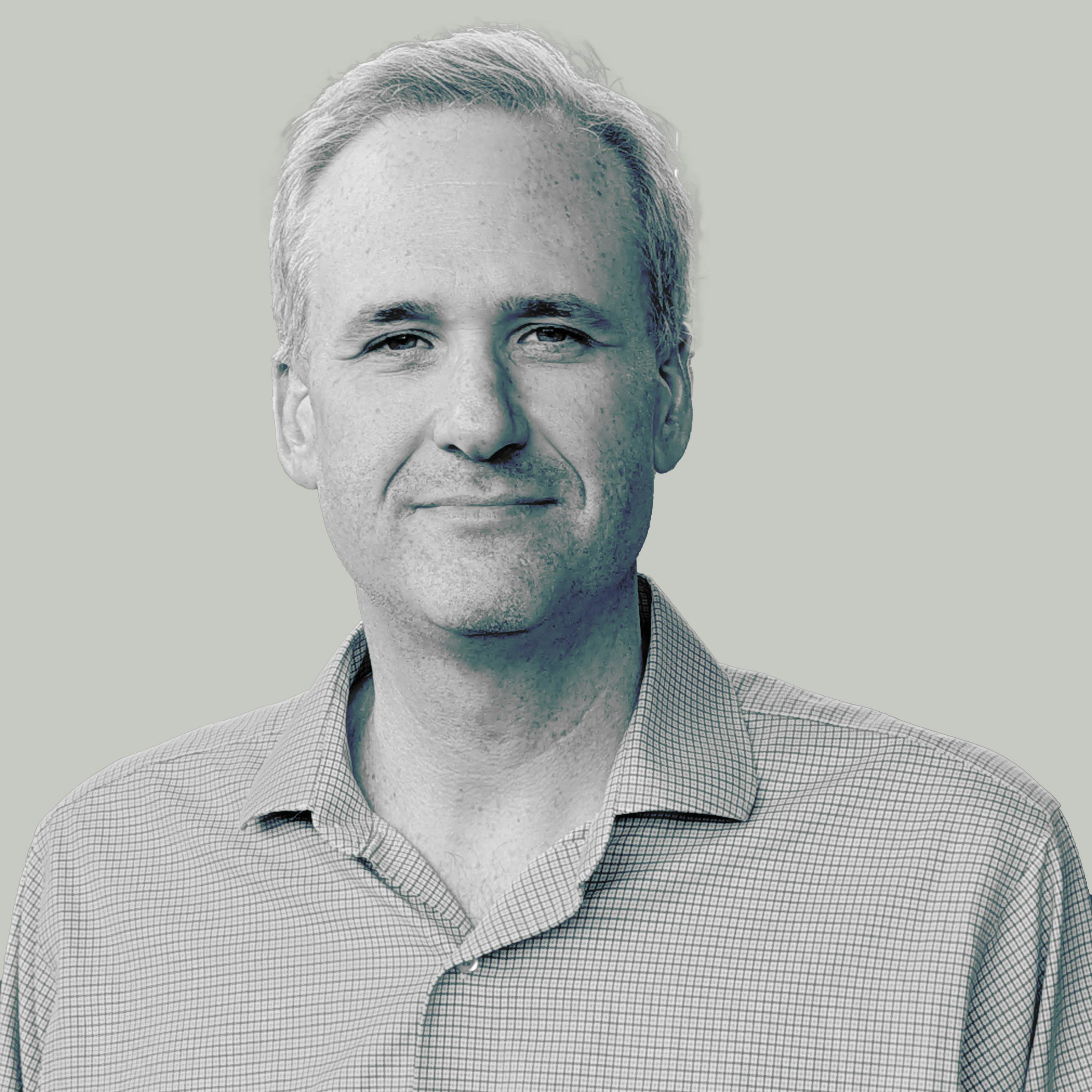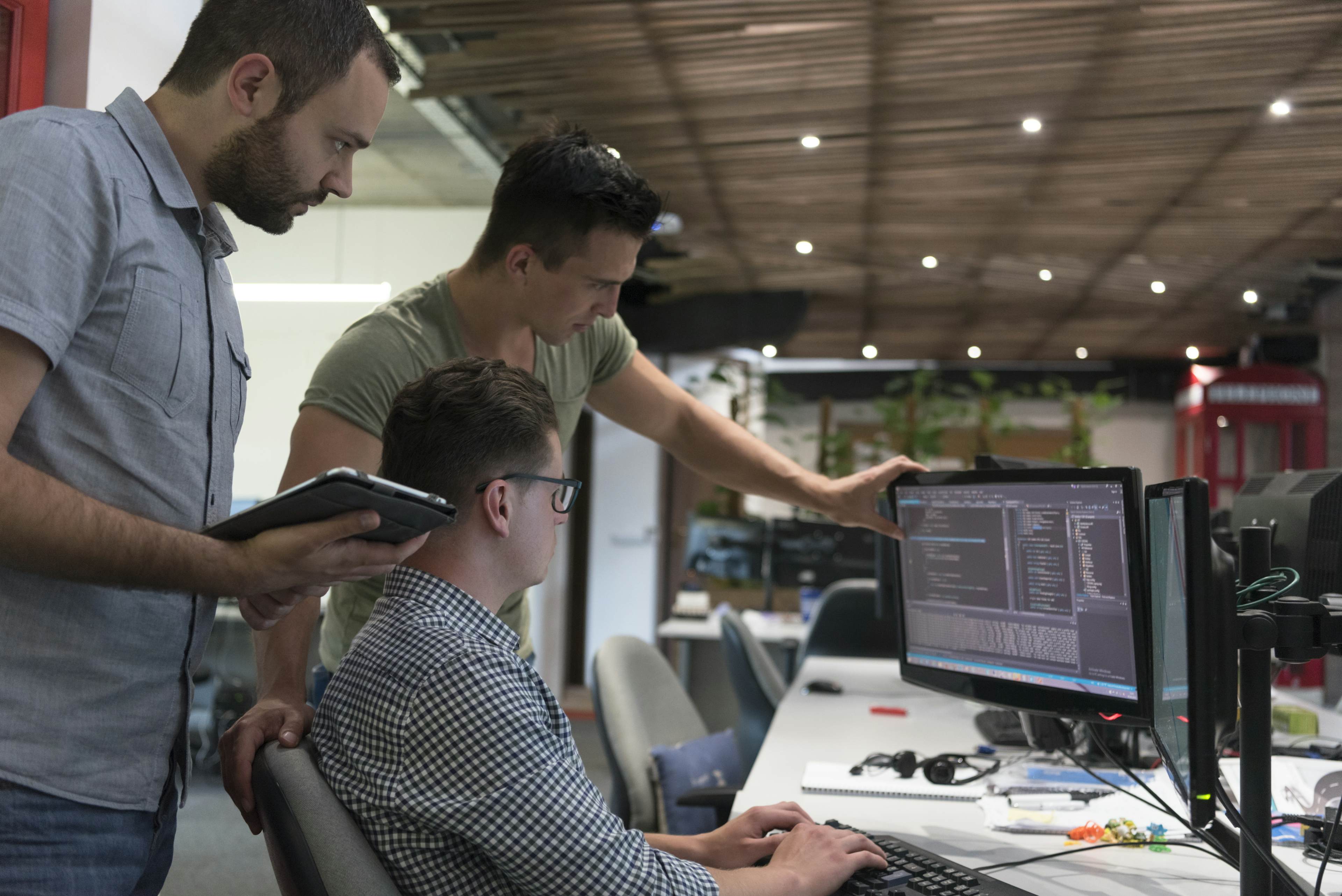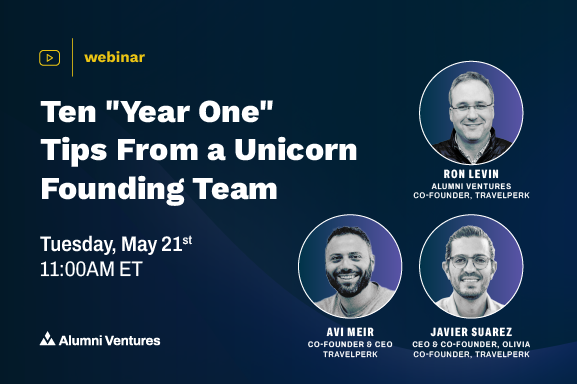Ten "Year One" Tips From a Unicorn Founder
Ron Levin, a seasoned VC and founding CEO of TravelPerk, shares invaluable insights from his journey to building a unicorn startup.

Reflecting on his initial year at TravelPerk, Ron Levin offers ten foundational tips for new founders. His advice encapsulates the essence of entrepreneurship: balancing vision with practical execution to create a scalable and successful venture.
“Creating a unicorn takes effort, not luck. Start with the right team, vision, and execution.” – Ron Levin

Ron Levin
Venture CapitalistRon is Managing Partner at Alumni Ventures, where he leads the AV Seed fund. Prior to joining AV in 2019, Ron was both an angel investor and advisor to multiple high-growth technology startups. He was previously co-founder and CEO at TravelPerk, an enterprise travel platform based in Barcelona that is now valued at over $1 billion. Earlier in his career, Ron was a consultant with McKinsey & Co. and he has spent much of his professional life working at the intersection of the aviation, travel, and technology sectors. Deeply committed to social impact through entrepreneurship, Ron recently published the book “Higher Purpose Venture Capital,” which profiles 50 venture-backed startups that are making a difference for society.
Although I have been a venture capitalist for nearly five years now, I often contemplate the vivid memories from the year I spent as founding CEO of Barcelona-based TravelPerk. It was in early 2015 that I began this enterprise travel platform alongside Avi Meir and Javier Suarez.
I left the company early on, when we were just a dozen people and had raised only $1 million in funding. Today, the company boasts more than 1,200 employees with offices around the world. Even more impressively, it has been backed by hundreds of millions of dollars in VC funding, helping it lay claim to “unicorn” status with its $1.4 billion valuation as of January 2024.
Now I can step back and reflect on my brief time at TravelPerk and the company’s astonishing journey from an idea in a slide deck to over $100 million in annual revenue. I am grateful to be able to share ten pieces of advice for founders as they embark upon the first year of creating a scalable venture that might one day also call itself a unicorn.
1. Pick your co-founders wisely.
If you’re going to do this seriously, you want to surround yourself with the best. Partner up with those who share your values, but complement your skills. If you haven’t worked extensively with your co-founders previously, take some time to “date” them and even do a project together to see if you’re able to collaborate and whether the output from the two of you is greater than the sum of the parts. The founding team needs a well-rounded skill set. Ideally among you, someone should have a particular strength in product, technology, sales, marketing, finance, operations, and organization and culture. Figure out early who the “point person” is for each
You’re undoubtedly going to have disagreements with your co-founders and probably some tense and rocky moments. But it’s critical that you know that your fellow founders share a vision, have similar core values, and will be able to move quickly past those stressful moments to pursue your shared vision.
2. Don’t be afraid to talk about your idea.
Unless you’re running a deep tech business that hinges on IP and you have not yet solidified your patents, then stealth mode is overrated. No one is out to steal your idea, and ideas are a dime a dozen anyway. It’s about execution, and part of that early execution is attracting a community of stakeholders. Solicit feedback and find early champions who will support what you are doing as a customer, advisor, investor, or merely a supporter of your mission.
Talk to VCs early as well, even if they’re unlikely to invest at the beginning. Several of our early VC conversations led to introductions to angel investors who participated in the first raise. Other first-year conversations with investors led to their writing a check later on. I first spoke with Spark Capital one year before they came in to lead the Series A. Keep on sharing what you’re doing, as the network that you build early on will lay the foundation for success as you mature.
3. Bring on advisors who have blazed a trail that you seek to follow.
Having the right advisors early on is key. For one, you can tap into mentorship and insights from entrepreneurs and leaders whom you admire. Advisors are typically compensated with equity, so this is a source of valuable advice that won’t require burning precious cash.
I’d urge you to reach out to advisors who have already been where you hope to go as a startup. In our very first days, I emailed Johannes Reck, Co-Founder and CEO of GetYourGuide, a high-flying booking platform for travel tours and activities. His involvement was instrumental in helping us set the right priorities. Moreover, his involvement validated the seriousness of our new venture with investors, customers, and others within the travel technology ecosystem.
4. Raise initial capital from both angels you know and angels you don’t.
You will know that people believe in you when you have investors willing to put money into your venture without even hearing your pitch. Credit to my friend and 2x classmate Jeff Del Papa and my former professor and mentor Elizabeth Riley, both of whom offered to invest on the mere mention that I was formulating a new venture in the travel space. That boost of confidence was worth far more than the cash that they put in (though that was undeniably valuable, too).
It is also important to know that you can raise money from serious angel investors whom you have not met before. For us, we were able to raise from successful travel investors like Roland Zeller, as well as full-time experienced angels like Paolo Rubatto. When we received the biggest commitment of our initial round from Robin Klein and Saul Klein of LocalGlobe, we knew that we would be in good shape and our story would resonate with institutional investors as well. Challenge yourself to entice a diverse group of early investors who can help to support and validate the attractiveness of your venture.
5. Don’t get greedy about your initial valuation.
Our initial SAFE was capped at a $2.5 million valuation, which felt modest then and would certainly seem “cheap” today. However, we knew that investors would align with this. We understand that we were in Barcelona and weren’t going to benefit from Silicon Valley hype.
We were also humble. Although we had all come from Booking.com, an extraordinarily successful leader in the online travel space, we also wanted to raise the initial million dollars in capital from the right investors and then move on to building a business. We, as founders, still had plenty of equity, and knew we would be rewarded if things went well. We even contributed a significant amount of our own personal capital to show investors that we were serious and committed. This should always be done by founders who have the means to do so.
Learn More About the Seed Fund
Invest in entrepreneurial companies at the earliest stage where the opportunities for value creation are typically highest and company valuations are usually at their lowest.
Max Accredited Investor Limit: 249
6. Go to market before you’re ready.
While I am hardly the first person to preach this axiom, it is worth reinforcing that no product is ever “perfect.” The best software companies in the world have armies of engineers who are constantly iterating, testing, and improving.
The very first online travel booking function that we built at TravelPerk had a usable front-end, but no back end. Yet we onboarded real customers, including some in Asia who were booking travel at 3am European time. When one of those bookings came in, one of us had to manually make the booking and send the customer its confirmation as quickly as humanly possible. The three founders each took turns on a 24-hour cycle, which didn’t help our sleep rhythms, but was critical for the vital early learnings that came from this experience.

7. Seek customer feedback early and often, and don’t get overly wedded to your initial concept.
For the first ten months of TravelPerk’s existence, our aim was to essentially replicate the business model of a US-based startup called Rocketrip for the European market, which provided incentives for employees to save their employers money on business travel. We developed an algorithm to set a baseline price based on a company’s parameters. If the employee went with a less expensive option (or even stayed with a friend instead of a hotel, for example), they could split the cost savings with their employer. It seemed like a “win-win.”
Unfortunately, this idea was a little too avant-garde for most European companies we approached. Too many concerns arose for us around gamification (risk of employees creating “unnecessary” trips or “faking” parameters for a baseline fare), not to mention the tax ramifications of rewarding employees in this way.
However, because we built this tool and shared it with potential customers, we started to learn what business travel needs were truly top of mind for small and medium enterprises. This led us to pivot to a far greater vision of transforming the entire business travel booking and management process by creating a host of other features that incumbent travel services were not adequately delivering.
8. Being pennywise is not foolish.
Having discipline with cash is good medicine for any startup and sets the right tone as the company builds its ethos. We were headquartered in Barcelona, which has a very high-quality of life and is able to attract talent at a lower cost than many other European or other American cities. Had we not been able to hire software talent at a reasonable rate, we may have sought to build a remote workforce so as not to blow up our budget.
We took money-saving measures to an extreme in our initial road trips to visit investors and customers. The three founders, for instance, shared a room in a dingy Airbnb in London because the city’s hotel room rates seemed extravagant for a modestly capitalized, pre-revenue business. We felt that our capital was better deployed for building a product and team. Managing runway is everything at this stage, and pinching pennies is no vice when there is minimal value to be added from splurging on luxuries.
9. Hire well, treat people right, and move on quickly from those who don’t fit.
This is pretty self-explanatory, but the people you hire will make or break you early on. Attitude is everything. Startups are not for everyone, nor will your style jibe with everyone who you bring on. That’s human nature and how life is.
Empower your people as much as possible and separate from those who are not a fit. It’s hard to always know from job interviews which candidates will work out for the long run, so it’s best to accept quickly when a hiring mistake is made. Remain agile and motivate your team members by treating them with respect and recognizing both individual and collective achievements.
10. Dream big, but stay grounded and celebrate small wins.
Step in to do things that may seem “beneath” your pay grade. Someone needs to clean the office, set up the routers, visit the notary, and generally make sure basic things are functioning properly. A lot of the dirty hands work seems like it could be delegated to someone else but is often just more efficient or even necessary to do yourself.
It’s good to keep a vision of success in mind, but it’s important to stay rooted in the day-to-day and often menial work that needs to get done. When we first started accepting bookings at TravelPerk, we busted out the vuvuzela that I’d brought back from South Africa and made sure the entire neighborhood heard a celebratory blast to know that we had just bagged ourselves some revenue. Make memories out of those “firsts” and stay humble, as this all takes hard work. A few lucky souls out there will win the lottery by chance, but creating a unicorn takes effort.
I stepped down as TravelPerk’s CEO after our first year of operations as serious family health issues brought me back home to Boston. I can, therefore, claim little credit for what has led to the company’s success thus far. Those accolades are due to Avi (who transitioned from CTO to CEO and has remained in the role ever since) and Javier (who had the very original idea to start this venture) and continued as CPO until leaving a few years ago to eventually start a new mental health venture called Oliva. Credit even more to the thousands of TravelPerk current and former employees, advisors, investors, customers, suppliers, partners, and supporters.
I have had the privilege of observing the company’s growth over the years, but these reflections from our very first year remain as vivid as ever. TravelPerk has reached heights that we, as three co-founders, could have only dreamed of in late 2014, when our idea existed in no more than a few PowerPoint slides. This is proof positive that with the right idea at the right time, backed up by dedication, sound execution, and a powerful community of stakeholders, any startup vision can turn into a reality.
Learn More About the Seed Fund
Invest in entrepreneurial companies at the earliest stage where the opportunities for value creation are typically highest and company valuations are usually at their lowest.
Max Accredited Investor Limit: 249
This communication is from Alumni Ventures, a for-profit venture capital company that is not affiliated with or endorsed by any school. It is not personalized advice, and AV only provides advice to its client funds. This communication is neither an offer to sell, nor a solicitation of an offer to purchase, any security. Such offers are made only pursuant to the formal offering documents for the fund(s) concerned, and describe significant risks and other material information that should be carefully considered before investing. For additional information, please see here. Achievement of investment objectives, including any amount of investment return, cannot be guaranteed. Co-investors are shown for illustrative purposes only, do not reflect all organizations with which AV co-invests, and do not necessary indicate future co-investors. Example portfolio companies shown are not available to future investors, except potentially in the case of follow-on investments. Venture capital investing involves substantial risk, including risk of loss of all capital invested. This communication includes forward-looking statements, generally consisting of any statement pertaining to any issue other than historical fact, including without limitation predictions, financial projections, the anticipated results of the execution of any plan or strategy, the expectation or belief of the speaker, or other events or circumstances to exist in the future. Forward-looking statements are not representations of actual fact, depend on certain assumptions that may not be realized, and are not guaranteed to occur. Any forward-looking statements included in this communication speak only as of the date of the communication. AV and its affiliates disclaim any obligation to update, amend, or alter such forward-looking statements, whether due to subsequent events, new information, or otherwise.
